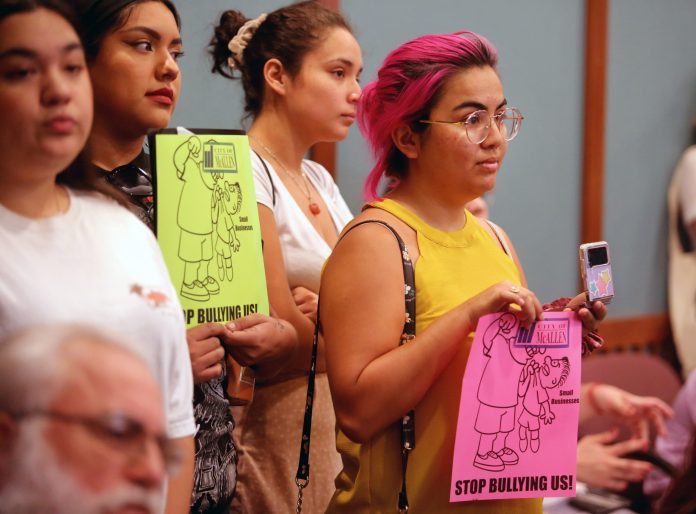
McALLEN — Following strong feedback from the small vendor community, city staff presented a revised version of an ordinance that would regulate pop-up markets in the city.
During a workshop Monday, the McAllen city commission revisited a proposed ordinance that had elicited impassioned pushback from the community during a workshop in July.
It was during that July workshop that the city commissioners first listened to a presentation on a proposal to regulate the pop-up markets.
Pop-up markets saw a surge in popularity throughout the Rio Grande Valley during the COVID-19 pandemic. However, the city’s code of ordinances currently prohibits outdoor sales of new or used merchandise.
The city has been permitting pop-up markets by processing them through a special permit process for amusements, Assistant City Manager Michelle Rivera told the city commission in July. But because pop-ups do not really fit that category, according to Rivera, and because the city had been receiving complaints from residents about disruptions caused by them, the city proposed an ordinance that would allow them in the city and impose regulations.
The proposed ordinance presented on Monday, though, looked much different than it did in July, incorporating much of the comments made at that time.
The revised proposed ordinance would require a permit to operate a pop-up market and they would be limited to no more than 12 times per year per address.
The cost of a one-time fee for each permit would depend on the number of participating vendors.
A pop-up market with one to 15 vendors would be charged a $50 permit fee; a pop-up market with 15 to 30 vendors would be charged a $30 permit fee; and a pop-up market with more than 30 vendors would be charged a $100 permit fee.
They would also be limited to operating within a C-3 general business zoning district or higher, would prohibit them from operating after 9 p.m., and prohibited from operating for more than 12 hours within any 24-hour period.
If a market is applying to be located within any multi-tenant plaza, then the applicant must first obtain written consent from at least 75% of all owners from that plaza.
While the main use of the plaza — or any proposed location for the pop-up market — is still open for business, no more than 25% of the total parking lot may be used for the pop-up market.
And finally, the proposed ordinance would require that all tents, stalls, and merchandise must be immediately removed from the property upon the expiration of the pop-up market’s permitted operating hours.
The city commissioners had lingering questions about the use of parking lots for the markets given that, as proposed, the ordinance would allow pop-up markets to use entire parking lots if the main business or main purpose for that lot was closed and thus possibly push parking to the street.
City Manager Roel “Roy” Rodriguez suggested leaving any restrictions on the use of parking lots up to the discretion of city staff as part of the permit application process.
Staff and legal counsel will address the parking issue as they continue to work on the proposed ordinance and will eventually present it to the commissioners for possible approval at a regular city commission meeting.
“You don’t have to take action the first time,” Rodriguez told the commissioners, “but our proposal would be to bring it for action and then if we still need to tweak it, we can do that.”



